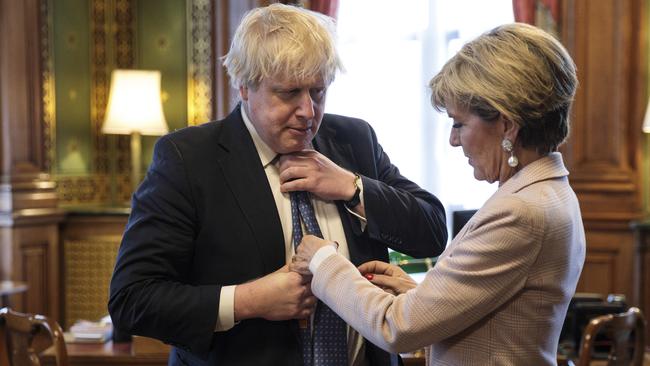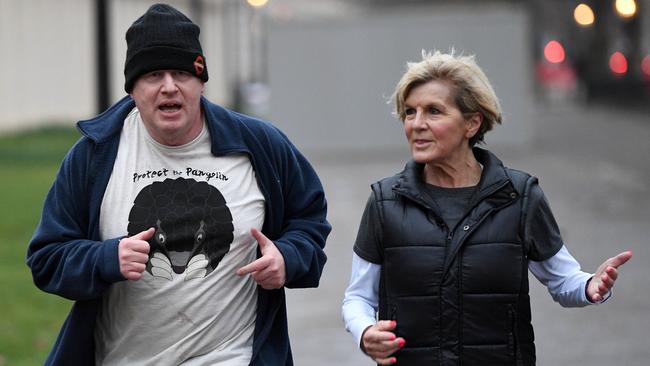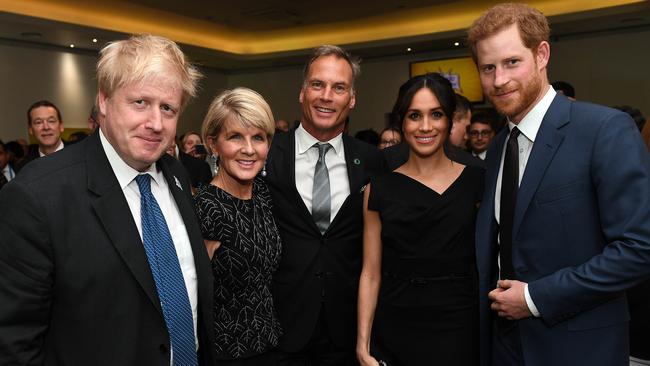Julie Bishop: ‘Boris Johnson is a huge win for Australia’
While many have reservations about what kind of Prime Minister Boris Johnson will be, I have no doubt that the man I know will rise to the job with excellence, writes former foreign minister Julie Bishop.

Rendezview
Don't miss out on the headlines from Rendezview. Followed categories will be added to My News.
Prime Minister Boris Johnson. While many hoped they would never hear that phrase, Alexander Boris de Pfeffel Johnson has fulfilled a lifelong ambition to lead his country.
Defined more by his eccentricity, gaffes and dishevelled appearance than by his policies, the man known the world over simply as Boris has continued to confound his critics by taking on one of the most important leadership roles in the world.
The United Kingdom is the sixth largest economy, a permanent member of the United Nations Security Council, a global economic, military and political powerhouse.
Many are now attempting to provide an informed answer to the question “Exactly who IS Boris Johnson”?
RELATED: Boris Johnson wins UK leadership race to become next Prime Minister
From Australia’s perspective, I am confident that Boris will prove to be an ardent supporter of an enhanced UK-Australia relationship.
I first met Boris in 2012 in London during his time as Mayor.
He was larger than life, bubbling with enthusiasm, as he related his notorious escapades as a young man travelling around Australia.
What struck me was that Boris in private was precisely the same as I had seen on television, even to the extent of his colourful and hilarious anecdotes told in the same vein as his many provocative and outrageous articles published in various newspapers.

However beneath the boisterous exterior he displayed what seemed to be a genuine interest in my opinions on the state of UK-Australia relations.
His obvious warmth towards Australia and its people was due in part, he said, to spending his gap year before University as a tutor at Geelong Grammar in 1983.
I was impressed by his passion for closer relations with Australia and he was particularly interested in pursuing visa arrangements that would make it easier for an exchange of our young people.
I left that meeting with copies of his recent books and a deep impression that he had researched the visa issue and well understood the implications.
Boris brought these same qualities to his two-year stint as UK Foreign Secretary from July 2016 to July 2018.
There were mixed feelings, to say the least, in the diplomatic community at his appointment with some trepidation on the part of other foreign ministers.
Boris quickly won over most of his counterparts by combining his charm and wit with a mastery of many subjects.
One of his regular sparring partners was the tall and imposing Russian Foreign Minister Sergei Lavrov whose sneering put downs were legendary.

Their often tense exchanges were justified by Boris as his defence of western liberal philosophy and the principle of individual freedom.
Boris brought great energy and passion to his work as Foreign Secretary and he had a clear focus on achieving change for the better.
He was a positive influence in many discussions although he never hesitated to stand his ground when more challenging conversations were required.
My first meeting with Boris as counterpart Foreign Ministers began with his declaration that we needed to conclude a UK-Australia free trade agreement as soon as possible.
This sent his officials into minor panic as the United Kingdom was still bound by its obligations to the EU and could not negotiate such agreements.
RELATED: What Boris Johnson as UK Prime Minister means for Australia
I took this as an expression of his focus on the big picture and his desire to bring about significant change as soon as possible.
His ambition and optimism will need to be founded on gritty reality in the coming months to 31 October, by which time Boris has promised to take Britain out of the EU, regardless of whether a deal has been finalised.

In my discussions with European negotiators, they made it clear they would not make it easy for the UK to leave on favourable terms as they do not wish to set a precedent for other EU nations.
From their perspective, favourable terms for the UK would strengthen the arm of anti-EU movements and threaten the very fabric of the EU.
Australia can look forward to a significant reinvigoration in our relations with the UK with Boris as Prime Minister.
He has already stated his support for a free-trade agreement, enhanced travel arrangements and closer engagement through our officials and business community.
I expect he will continue his interest in strengthening the role of the Commonwealth as a network of nations committed to democratic ideals, freedom and the rule of law.
This will align closely with Australia’s interests, particularly as many of the Pacific Island nations in our region are also members of the Commonwealth.
We can expect Boris to continue his unconventional and quirky approach to public office.
He will undoubtedly continue to do and say things that will invoke outrage from various quarters.
Australians should judge Boris by his commitment to strengthening the UK-Australia relationship which is squarely within our interests.
In that context we will have a great friend at Number 10 Downing Street.
Julie Bishop was Australia’s Minister for Foreign Affairs from 2013 to 2018.
Originally published as Julie Bishop: ‘Boris Johnson is a huge win for Australia’


